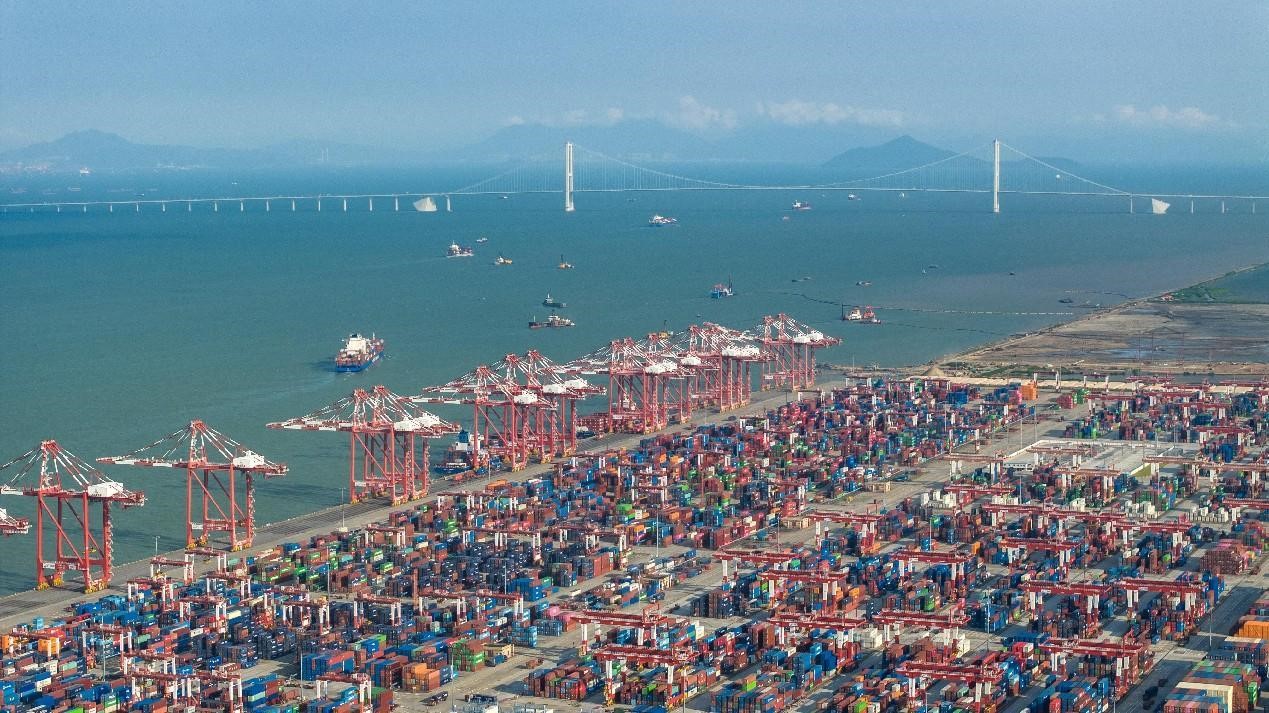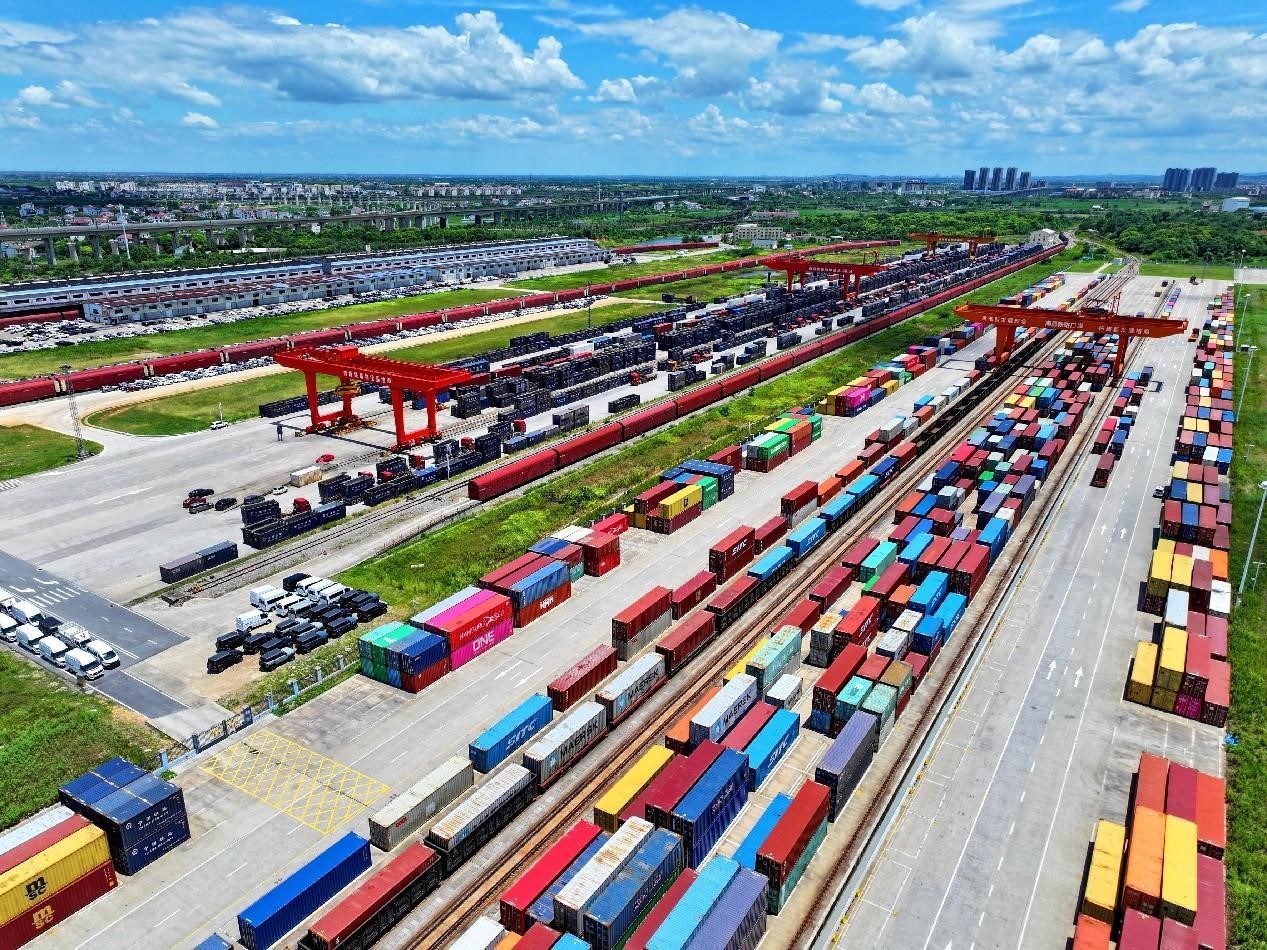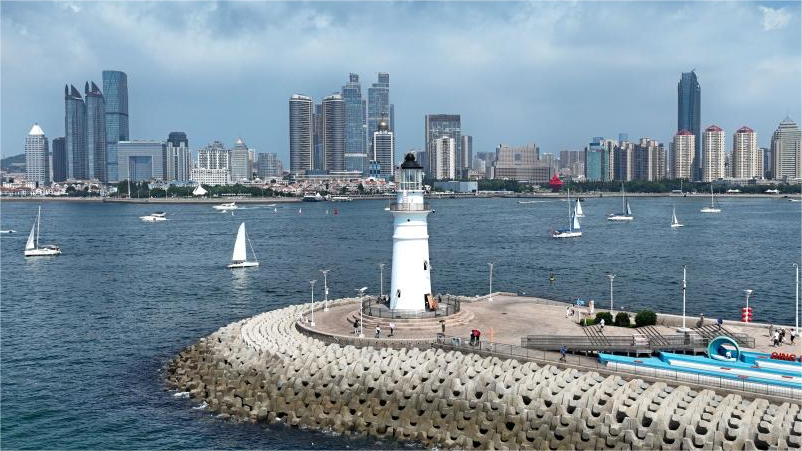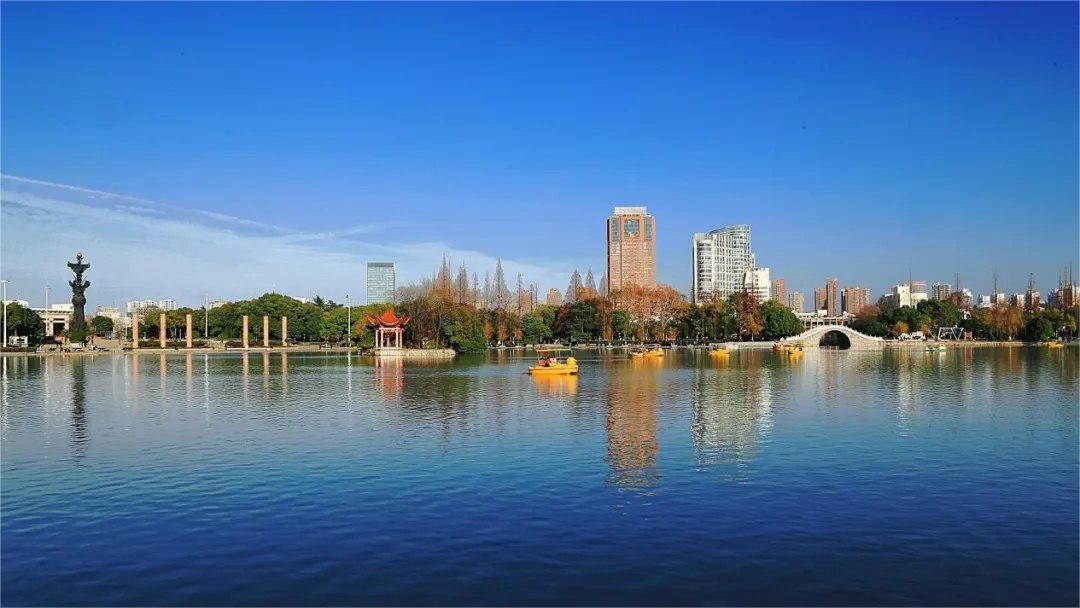China upholds win-win cooperation, promotes economic globalization

Photo shows a busy scene of a container terminal of Nansha Port, Guangzhou, south China's Guangdong province. (People's Daily Online/Chen Zhiqiang)
In the era of economic globalization, what is needed is not gaps of division but bridges of communication, not iron curtains of confrontation but highways of cooperation.
In today's world of turmoil and transformation, mounting unilateralism, protectionism as well as backlash against globalization have added to risks and uncertainties to the global development. Countries need to enhance their ability to cooperate and achieve win-win outcomes, and stay on the right path of seeking solidarity and cooperation.
The principle of win-win cooperation underscores the imperative to actively pursue converging interests, leverage respective strengths, carry out mutually beneficial cooperation and enable each other's success. As the world's second-largest economy and the largest developing country, China always sticks to a development path that is peaceful, open, cooperative and inclusive.
On June 28, Chinese President Xi Jinping delivered an important speech at the Conference Marking the 70th Anniversary of the Five Principles of Peaceful Coexistence in Beijing. He noted, "China has been advocating a universally beneficial and inclusive economic globalization, promoting high-quality Belt and Road cooperation, and endeavoring to deliver on the Global Development Initiative (GDI). Our goal is to benefit all with the opportunity of development, to diversify development paths, to help all nations share development fruits, to encourage common development and prosperity for all countries in the global village, and to turn win-win into a solid consensus."
Opening up is the defining feature of Chinese modernization. China remains committed to promoting reform through opening up, enhancing its capacity for opening up while expanding cooperation with other countries, and sharing development opportunities and dividends with the world.
China pursues high-level institutional opening up and maintains a management system of pre-establishment national treatment plus a negative list for foreign investment. It works to remove all restrictions on foreign investment access in the manufacturing sector and strengthen the protection of intellectual property rights. China's global ranking for its business environment has risen to 31st place in the latest ranking from 96th.

Photo shows a container yard of Nanchang International Land Port in Nanchang, east China's Jiangxi province. (People's Daily Online/Zhu Haipeng)
China leads the world in total volume of trade in goods, and it is a major destination for global investment. According to China's General Administration of Customs, the country's total goods imports and exports expanded by 6.2 percent year-on-year to reach 24.83 trillion yuan ($3.46 trillion) in the first seven months of this year. It was a result of China's efforts to further expand high-level opening-up, and also brought new opportunities to countries around the world.
China firmly opposes all forms of unilateralism and protectionism, continuously promotes trade and investment liberalization and facilitation, focuses on resolving structural challenges that hinder the healthy development of the global economy, and maintains the stability and smooth flows of the global industrial and supply chains.
Facts have proved that unilateralism and protectionism win no support, and win-win cooperation is the common choice of the vast majority of countries.
On March 27, Xi met with Prime Minister of the Netherlands Mark Rutte in Beijing, during which he stressed that economic globalization may encounter headwinds, but the historical trend will not change. There is no way out for "decoupling and breaking the chain," and opening-up and cooperation are the only choice. Rutte said that "decoupling and breaking the chain" is not a policy choice of the Dutch government, since any act undermining China's development interests will only boomerang.
On April 16, Xi met with German Chancellor Olaf Scholz in Beijing, during which he said that China's export of electric vehicles, lithium batteries and photovoltaic products has not only enriched global supply and eased global inflationary pressure, but also made important contribution to the global response to climate change and the green and low-carbon transition. Scholz said that Germany opposes protectionism and supports free trade.
From May 8 to 10, Xi paid a state visit to Hungary, during which he held talks with Hungarian Prime Minister Viktor Orban in Budapest. Orban said during his talks with Xi that his country does not identify with the rhetoric of so-called "overcapacity" or "de-risking." Hungary is willing to strengthen multilateral communication and cooperation with China and will not be disturbed by any force.

Surfboards to be exported are manufactured in a workshop of an outdoor sports equipment company in Rongcheng, east China's Shandong province. (People's Daily Online/Li Xinjun)
Just as China has reached its current position and integrated into the world through reform and opening up, it will undoubtedly march forward and benefit the globe by deepening reform across the board.
The third plenary session of the 20th Central Committee of the Communist Party of China has outlined a grand blueprint for further deepening reform comprehensively to advance Chinese modernization, emphasizing the importance to improve high-level institutions and mechanisms for opening up to the outside world.
In the future, China will steadily expand institutional opening up, deepen the foreign trade structural reform, further reform the management systems for inward and outward investment, improve planning for regional opening up, and refine the mechanisms for high-quality cooperation under the Belt and Road Initiative.
China will safeguard the WTO-centered multilateral trading system, actively participate in the reform of global economic governance, and contribute to the public good in the world.
China will advance the GDI, scale up input in global development cooperation, and help fellow developing countries build capacity for self-generated development. It will work with other developing countries to make the pie of economic globalization bigger and share it fairly, and pursue more adequate and balanced development. It will continue to make economic globalization more open, inclusive, balanced and beneficial to all.
Moving forward, China is ready to be a companion of all countries on the path to modernization, and welcomes them to board the "express train" of Chinese modernization.
Photos
Related Stories
- China advocates equal, orderly multi-polar world, inclusive economic globalization that benefits all: FM
- China expects further cooperation with World Bank
- China willing to be stabilizing force for global growth: FM
- To make economic globalization more open, inclusive, balanced, beneficial to all
- Chinese FM spokesperson calls on global community to tackle fragmentation together
Copyright © 2024 People's Daily Online. All Rights Reserved.









